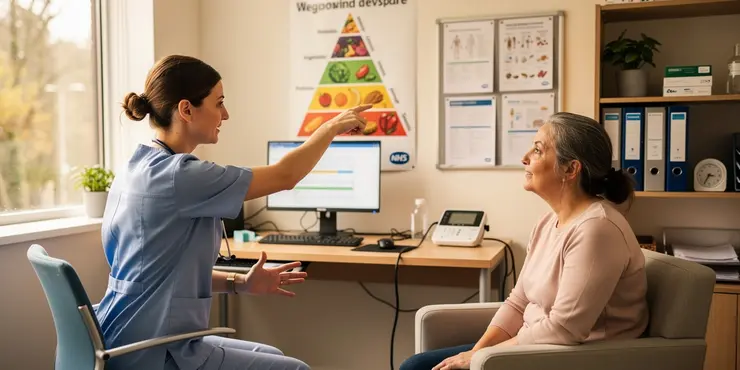
Find Help
More Items From Ergsy search
-

Understanding the Benefits of the Mediterranean Diet
Relevance: 100%
-

What is the DASH diet?
Relevance: 38%
-

Can diet affect asthma?
Relevance: 37%
-

Can diet affect psoriasis?
Relevance: 36%
-

Can diet affect ADHD symptoms?
Relevance: 36%
-
What role does diet play in menopause masking?
Relevance: 30%
-

Can diet affect eczema?
Relevance: 29%
-

What is the best diet for Crohn’s disease?
Relevance: 28%
-
Can a low-fat diet be unhealthy?
Relevance: 28%
-

What is the role of diet in managing heart failure?
Relevance: 27%
-

Can diet impact BPH?
Relevance: 27%
-
Can orange juice be part of a healthy diet?
Relevance: 27%
-

Record Number of Brits Embrace Plant-Based Diets for Wellbeing
Relevance: 27%
-

What role does diet play in managing obesity?
Relevance: 27%
-
Why is fat important in my diet?
Relevance: 27%
-
Does orange juice have any role in detox diets?
Relevance: 27%
-
What is the recommended daily fat intake for a 2,000 calorie diet?
Relevance: 27%
-
Can diet affect tinnitus?
Relevance: 27%
-

Is diet linked to the rise in bowel cancer?
Relevance: 26%
-

Does your diet affect IBS?
Relevance: 26%
-
What is the role of sugar in a balanced diet?
Relevance: 26%
-
Can sunflower oil be part of a heart-healthy diet?
Relevance: 26%
-
Are there any populations with high seed oil usage and low disease rates?
Relevance: 26%
-

Can diet impact postnatal depression?
Relevance: 25%
-

What type of research supports the role of diet in prostate cancer management?
Relevance: 25%
-

How does diet affect blood pressure?
Relevance: 25%
-
What is the omega-6 to omega-3 ratio in diets?
Relevance: 25%
-

Can diet influence cortisol levels?
Relevance: 25%
-
Are there any cardiovascular benefits to using sunbeds?
Relevance: 25%
-

Do you need to follow a specific diet while on Wegovy?
Relevance: 25%
-

Can junk food be part of a balanced diet?
Relevance: 24%
-

What are the benefits of insoluble fiber?
Relevance: 24%
-

How does diet affect tooth decay?
Relevance: 24%
-

Coeliac Disease: The gluten free diet
Relevance: 24%
-

Can diet or lifestyle changes prevent appendicitis?
Relevance: 23%
-

New Study Links Diet Soda to Increased Risk of Heart Disease
Relevance: 23%
-
Does orange juice have health benefits for the heart?
Relevance: 23%
-

NHSGGC - Diet and Chronic Kidney Disease (CKD)
Relevance: 23%
-

Can diet influence hay fever symptoms?
Relevance: 23%
-

How does a high-sugar diet affect gut health in older adults?
Relevance: 23%
Introduction to the Mediterranean Diet
The Mediterranean diet is a way of eating based on the traditional cuisine of countries bordering the Mediterranean Sea. It emphasizes generous portions of fruits and vegetables, whole grains, olive oil, and fish while reducing red meat and processed foods. This dietary pattern has become increasingly popular in the UK due to its numerous health benefits and delicious, diverse food options.
Health Benefits
One of the most lauded benefits of the Mediterranean diet is its positive impact on heart health. The diet is rich in monounsaturated fats from olive oil and omega-3 fatty acids from fish, both of which have been shown to improve cholesterol levels and reduce the risk of heart disease. Furthermore, the high intake of fruits, vegetables, and whole grains provides essential nutrients and antioxidants that protect against cardiovascular issues.
The Mediterranean diet is also linked with a lower risk of developing type 2 diabetes. The emphasis on high-fibre foods like legumes and whole grains helps regulate blood sugar levels. Moreover, the diet's plant-based approach and moderate consumption of healthy fats contribute to improved insulin sensitivity.
Mental Health and Longevity
Studies suggest that adhering to a Mediterranean-style diet may benefit mental health by reducing the risk of depression and cognitive decline. The anti-inflammatory properties of the diet, coupled with its rich nutrient profile, support brain health and function. The social aspect of Mediterranean dining, which often involves sharing meals in pleasant social settings, also contributes to a strengthened mental well-being.
Additionally, the Mediterranean diet is associated with increased longevity. Regions where the diet is traditionally consumed, such as parts of Italy and Greece, often report higher than average life expectancies. This association is largely attributed to the diet’s heart-healthy components and overall balanced nutrition, which help mitigate chronic disease risks.
Environmental and Lifestyle Benefits
Beyond personal health, the Mediterranean diet is environmentally sustainable. It prioritises plant-based foods, which generally require fewer resources and produce less greenhouse gas emissions compared to meat-heavy diets. Aligning with such principles promotes not only individual health but also environmental responsibility.
Embracing the Mediterranean diet is not only about the food itself but also about adopting a more holistic lifestyle. This includes enjoying meals with family and friends, maintaining an active lifestyle, and being mindful of the quality of foods chosen. Such practices align closely with health guidelines promoted within the UK, helping to foster a balanced and fulfilling way of life.
Introduction to the Mediterranean Diet
The Mediterranean diet is a way of eating from countries near the Mediterranean Sea. It focuses on lots of fruits and veggies, whole grains, olive oil, and fish. It suggests eating less red meat and processed food. This diet is popular in the UK because it's healthy and tasty.
Health Benefits
This diet is good for your heart. It uses olive oil and fish, which are healthy fats. These help with cholesterol and keep your heart healthy. Eating plenty of fruits, veggies, and grains gives you important nutrients that help protect your heart.
The Mediterranean diet also helps lower the chance of getting type 2 diabetes. Foods like beans and grains help keep your blood sugar steady. Eating plants and healthy fats helps your body use insulin better.
Mental Health and Longevity
This diet can also help your mind. It may lower the chances of feeling sad or your brain not working as well when you get older. The diet is good for the brain because it reduces swelling and gives a lot of nutrients. Eating together and sharing meals with friends or family makes people feel happier.
People who eat this diet often live longer. In places like Italy and Greece, people live longer because this diet keeps their hearts strong and bodies healthy.
Environmental and Lifestyle Benefits
This diet is good for the planet too. Eating less meat and more plants uses fewer resources and is better for the Earth. By eating like this, you help yourself and the environment.
It's not just about food. It's about living a happy life. Enjoy meals with friends and family, stay active, and choose good quality food. These habits are a part of a happy, healthy life.
Frequently Asked Questions
What is the Mediterranean diet?
The Mediterranean diet is a dietary pattern inspired by the traditional eating habits of countries bordering the Mediterranean Sea, focusing on plant-based foods, healthy fats, lean proteins, and moderate alcohol consumption.
What are the main components of the Mediterranean diet?
The diet emphasizes fruits, vegetables, whole grains, legumes, nuts, olive oil, fish, poultry, and red wine in moderation, while limiting red meat, processed foods, and refined sugars.
How does the Mediterranean diet benefit heart health?
The Mediterranean diet is rich in heart-healthy fats, such as those found in olive oil and fish, which can help lower cholesterol levels and reduce the risk of heart disease.
Can the Mediterranean diet help with weight loss?
Yes, the diet encourages the consumption of nutrient-dense, low-calorie foods that can help with weight management and reduce overall calorie intake.
Is the Mediterranean diet good for diabetes management?
The diet’s emphasis on whole grains and non-processed foods helps regulate blood sugar levels, making it beneficial for diabetes management.
Does the Mediterranean diet reduce inflammation?
Yes, many components of the diet, such as fruits, vegetables, nuts, and olive oil, have anti-inflammatory properties that can help reduce chronic inflammation in the body.
How does the Mediterranean diet impact brain health?
The diet is associated with a lower risk of cognitive decline and may help prevent neurodegenerative diseases, thanks to its rich supply of healthy fats, antioxidants, and anti-inflammatory compounds.
Is the Mediterranean diet sustainable long-term?
Yes, it is considered one of the most sustainable dietary patterns due to its emphasis on whole, minimally processed foods and balanced meals, making it easier to maintain over time.
Can the Mediterranean diet improve gut health?
The diet is high in fiber-rich foods like fruits, vegetables, and whole grains, which support healthy digestion and promote a more diverse gut microbiome.
What makes olive oil a key component of the Mediterranean diet?
Olive oil is a primary fat source in the diet, rich in monounsaturated fats and antioxidants, which contribute to many of the health benefits associated with the diet.
How does the Mediterranean diet support bone health?
The diet includes foods rich in calcium and vitamin D, such as dairy and green leafy vegetables, supporting stronger bones and reducing the risk of osteoporosis.
What role do nuts and seeds play in the Mediterranean diet?
Nuts and seeds provide healthy fats, protein, and fiber, contributing to cardiovascular health, weight management and reducing inflammation.
Why is moderate wine consumption included in the Mediterranean diet?
Moderate wine consumption, particularly red wine, is believed to offer cardiovascular benefits due to its high levels of antioxidants like resveratrol.
Can the Mediterranean diet help lower cholesterol?
Yes, the diet's focus on healthy fats, fiber, and plant-based foods can help improve cholesterol profiles, lowering LDL (bad) cholesterol levels and increasing HDL (good) cholesterol.
Is the Mediterranean diet effective for managing hypertension?
The diet is associated with lower blood pressure levels due to its high potassium content from fruits and vegetables and healthy fat sources that improve blood vessel function.
Can vegetarians follow the Mediterranean diet?
Yes, vegetarians can follow the diet by focusing on plant-based protein sources like legumes, nuts, and seeds, while still adhering to the principles of the Mediterranean diet.
What is a typical meal in the Mediterranean diet?
A typical meal might include grilled fish, a variety of colorful vegetables, a whole-grain dish like barley or farro, a salad with olive oil and vinegar dressing, and fresh fruit for dessert.
How does the Mediterranean diet benefit skin health?
The diet is rich in antioxidants and healthy fats, which can help maintain skin elasticity, reduce signs of aging, and protect against damage from the sun and environmental factors.
Is the Mediterranean diet expensive to follow?
While some ingredients like fresh fish and extra-virgin olive oil can be costly, the diet emphasizes locally-sourced, seasonal produce, whole grains, and legumes, which can be budget-friendly.
How does the Mediterranean diet fit into a busy lifestyle?
Preparing large batches of grains and legumes in advance and incorporating simple, wholesome ingredients can make following the diet convenient for those with busy schedules.
What is the Mediterranean diet?
The Mediterranean diet is a way of eating. It is based on foods that people in countries around the Mediterranean Sea eat. These countries are places like Italy, Greece, and Spain. The diet is healthy and good for your heart.
Here are some things to eat on the Mediterranean diet:
- Lots of fruits and vegetables
- Whole grains, like brown bread and rice
- Nuts and seeds
- Olive oil instead of butter
- Fish and chicken, not too much red meat
- Beans and lentils
It is important to drink enough water and sometimes a little red wine.
To make it easier, you can:
- Make your meal plan with a helper or app
- Use pictures of foods to help you choose
- Cook with family or friends for fun and support
The Mediterranean diet is a way of eating. It comes from countries near the Mediterranean Sea. This diet focuses on eating lots of fruits and vegetables, good fats like olive oil, lean meat like chicken or fish, and a little bit of alcohol.
What is the Mediterranean Diet Made Of?
The Mediterranean diet is a way of eating that is good for you. Here are the main things it includes:
- Lots of fruits and vegetables. These are foods like apples, oranges, lettuce, and carrots.
- Whole grains. This means foods like whole bread, pasta, and rice that are brown and not white.
- Healthy fats. Olive oil is a good healthy fat used in this diet.
- Nuts and seeds. These are snacks like almonds and sunflower seeds.
- Fish and seafood. These are foods like salmon and shrimp that come from the ocean.
- Some dairy. This includes foods like cheese and yogurt.
- Very little red meat. Red meat is things like beef and pork and should be eaten less often.
Here are some tips to remember:
- Try cooking meals with olive oil instead of butter.
- Eat a handful of nuts if you want a snack.
Using pictures or apps to help plan meals can be a fun and easy way to try the Mediterranean diet.
This way of eating is about healthy foods. Eat lots of fruits, vegetables, whole grains, beans, nuts, and use olive oil. You can also eat fish and chicken. It's okay to have a little red wine. Try not to eat a lot of red meat, sugary foods, or foods that come in packages.
How does eating like people do in the Mediterranean help your heart?
Eating the Mediterranean way is good for your heart. Here's how:
- Eat lots of fruits and vegetables. They help keep your heart healthy.
- Use olive oil instead of butter for cooking. Olive oil is good for your heart.
- Eat fish. Fish like salmon or tuna can help your heart.
- Eat a small handful of nuts. They are good for your heart.
- Try to walk or play each day. Being active is healthy for your heart.
Use pictures of foods to help you know what to eat. Try to eat with family or friends and enjoy your meals together.
The Mediterranean diet is good for your heart. It has healthy fats you can find in olive oil and fish. These fats can help lower cholesterol and make your heart healthier.
Can eating like people in the Mediterranean help you lose weight?
The Mediterranean way of eating includes lots of fruits, vegetables, and healthy oils like olive oil.
This diet can help you stay healthy and might help you lose weight.
Try using a food diary to track what you eat. It can be a helpful tool.
Yes, the diet wants you to eat healthy foods that are good for you. These foods have lots of nutrients but not many calories. Eating them can help you keep a healthy weight and eat fewer calories.
Is the Mediterranean diet good for managing diabetes?
The Mediterranean diet can help people with diabetes. It includes lots of fruits, vegetables, whole grains, fish, and healthy fats like olive oil.
Eating this way may help control blood sugar levels and improve heart health.
If you have diabetes, also try to:
- Stay active and exercise regularly.
- Check your blood sugar often.
- Talk to a doctor or dietitian for more advice.
This diet is about eating whole grains and foods that are not processed. This can help keep your blood sugar levels steady. It is good for people with diabetes.
Can the Mediterranean diet help reduce swelling?
The Mediterranean diet is a way of eating. It has lots of fruits, vegetables, whole grains, and healthy oils. People wonder if this diet can help make swelling in the body go down.
Swelling is when part of the body gets bigger, red, and sometimes painful. It can happen when you are hurt or sick. Some foods can help swelling go down.
If you want to try the Mediterranean diet, talk to someone who knows about healthy eating, like a doctor or a nutritionist. They can help you find the right foods to eat.
Supportive tools that can help:
- Use simple pictures of foods that are part of the diet.
- Watch videos about cooking these healthy meals.
- Ask someone to help you read and understand this information.
Yes, there are some foods that can help you feel better.
Fruits, vegetables, nuts, and olive oil can help calm down the body's soreness. This helps the body feel less pain over a long time.
Try using pictures of these foods, or a chart, to help remember them. Reading with a friend or an adult can also make it easier to understand.
How does the Mediterranean diet help the brain?
The Mediterranean diet is about eating healthy foods. It includes lots of fruits, vegetables, nuts, and fish. This diet can help your brain stay healthy.
Eating these foods can make your brain work better. It might also help you remember things more easily.
If you have trouble reading, try using a ruler or your finger to follow the words. Reading in a quiet place can also help you understand better.
Eating this way can help keep your brain healthy. It might stop your brain from getting sick as you get older. This is because it has a lot of good fats, vitamins that protect your brain, and things that stop swelling.
Using pictures can help you understand better. Try breaking down big words into smaller parts.
Can people eat Mediterranean food for a long time?
The Mediterranean diet is about eating lots of fruits, vegetables, fish, and healthy oils. It is a good way to stay healthy.
Eating this way can be good for a long time. It helps your heart and keeps you strong.
If you want to try it, ask an adult for help. They can help you plan meals.
You can also use apps or cookbooks to learn more about cooking Mediterranean food.
Yes, this way of eating is really good for the planet. It focuses on whole foods that are not processed much. The meals are balanced, so they are healthy and easy to stick to for a long time.
Can the Mediterranean diet help your tummy feel better?
The Mediterranean diet is a way of eating. It includes lots of fruits, veggies, fish, and olive oil.
This diet might help your tummy work well. It can make your tummy bacteria healthy. Healthy bacteria help you feel good.
Try to eat like this if you can. Ask an adult to help you make yummy meals. Eating together can be fun!
This diet has lots of foods with fiber. Fiber is good for your tummy. You eat fruits, vegetables, and whole grains. They help your tummy work well and keep it healthy.
To understand better, you can use pictures of these foods or use a list to see what to eat.
Why is olive oil an important part of the Mediterranean diet?
Olive oil is a main type of fat we eat. It has healthy fats and helps keep your body strong. It also has things called antioxidants that are good for you.
If you want to learn more or need help understanding, you can use tools like audiobooks or picture-based reading apps!
How does the Mediterranean diet help keep bones strong?
The Mediterranean diet can make bones strong. It includes healthy foods like fruits, vegetables, and fish. These help bones grow and stay strong.
Eating foods with calcium, like cheese and yogurt, is good for bones. Olive oil is also a part of this diet and helps protect bones.
To remember what to eat, try making a list of healthy foods. Drawing pictures of the foods can help too. Ask someone to help you if needed.
The diet has foods that are good for your bones. These foods have lots of calcium and vitamin D. You can find them in milk, cheese, and green vegetables. Eating these foods can help make your bones strong and keep them healthy.
How do nuts and seeds help in the Mediterranean diet?
Nuts and seeds are important in the Mediterranean diet. They are good for your heart and give you energy.
You can eat nuts like walnuts and almonds. You can eat seeds like sunflower seeds and sesame seeds.
Nuts and seeds have healthy fats. These fats are good for your body.
You can eat a small handful of nuts or seeds as a snack or add them to your meals.
Try using picture cards or apps to remember which nuts and seeds to eat!
Nuts and seeds are good for you. They have healthy fats, protein, and fiber. These can help your heart stay healthy, help you keep a good weight, and make your body feel less sore.
Why do people in the Mediterranean diet drink a little wine?
People following the Mediterranean diet may drink a small amount of wine because it can be good for their heart. Drinking a little bit of wine can help you feel relaxed and happy. It is important to drink wine with a meal and not to have too much.
Helpful tips:
- Ask an adult if you are unsure about how much wine is okay.
- Remember that some people should not drink wine at all, like children or people who are unwell.
Drinking a little bit of wine, especially red wine, can be good for your heart. This is because red wine has something called antioxidants, like resveratrol, that help keep your heart healthy.
Can eating Mediterranean food help lower cholesterol?
The Mediterranean diet means eating foods from countries like Greece and Italy.
This can include fruits, veggies, fish, and olive oil.
Some people say this way of eating can help make your heart healthier by lowering cholesterol.
If you want to try, start by eating more fish, olive oil, and veggies.
Using reminders or food pictures can help you remember these healthy choices.
Yes, this diet is good for your heart. It tells you to eat healthy fats, fiber, and foods from plants. Doing this can make your cholesterol better. It can lower the bad cholesterol (LDL) and raise the good cholesterol (HDL).
If you have trouble reading, try asking someone to read it with you. You can also use apps that read text out loud to help understand better. Reading slowly and taking breaks can also make it easier.
Can the Mediterranean diet help with high blood pressure?
This way of eating can help keep your blood pressure low. It works because it includes lots of fruits and vegetables that have something called potassium. It also has healthy fats that help your blood vessels work better.
If reading is difficult, you can try using audiobooks or text-to-speech tools to listen instead of reading.
Can people who don't eat meat do the Mediterranean diet?
Yes, they can! The Mediterranean diet has lots of fruits, vegetables, nuts, and grains. You can swap meat for beans, lentils, or tofu.
If you need help, you can use a meal planner or talk to a dietitian. They can help you create yummy meals.
Yes, people who don't eat meat can follow this diet. They can eat foods like beans, nuts, and seeds for protein. This is a part of eating the Mediterranean way, which is very healthy.
What do people eat in a Mediterranean meal?
People eat foods that are good for you in the Mediterranean meal.
They eat:
- Fish and chicken
- Fruits and vegetables
- Nuts and seeds
- Olive oil
- Whole grains like bread and pasta
To make reading easier, use finger tracking or a reading ruler. You can also ask someone to read with you.
A common meal could have grilled fish, lots of colorful vegetables, a grain like barley or farro, a salad with olive oil and vinegar on it, and fresh fruit for dessert.
How does the Mediterranean diet help your skin?
The Mediterranean diet is good for your skin. It can help keep your skin looking healthy and nice.
This diet has lots of fruits, vegetables, fish, and healthy oils like olive oil. These foods give your skin the vitamins it needs.
Eating these foods can make your skin softer and help it stay younger-looking for longer.
Try keeping a food diary to see how your skin changes when you eat healthy foods. You can also use apps to track what you eat and see how it helps your skin.
This diet is full of good stuff that helps your body. It has special things called antioxidants and healthy fats. These help keep your skin stretchy and young-looking. They also protect your skin from the sun and other harmful things outside.
Is it expensive to eat a Mediterranean diet?
Eating fresh fish and special olive oil can be expensive. But this way of eating focuses on food that grows nearby, like fruits and veggies in season. It also includes things like whole grains and beans, which can be cheaper.
How can a busy person follow the Mediterranean diet?
Cook a lot of grains and beans at once. Add easy and healthy ingredients. This makes it easy to eat healthy, even if you are busy.
Useful Links
This website offers general information and is not a substitute for professional advice.
Always seek guidance from qualified professionals.
If you have any medical concerns or need urgent help, contact a healthcare professional or emergency services immediately.
Some of this content was generated with AI assistance. We’ve done our best to keep it accurate, helpful, and human-friendly.
- Ergsy carfully checks the information in the videos we provide here.
- Videos shown by Youtube after a video has completed, have NOT been reviewed by ERGSY.
- To view, click the arrow in centre of video.
- Most of the videos you find here will have subtitles and/or closed captions available.
- You may need to turn these on, and choose your preferred language.
- Go to the video you'd like to watch.
- If closed captions (CC) are available, settings will be visible on the bottom right of the video player.
- To turn on Captions, click settings .
- To turn off Captions, click settings again.
More Items From Ergsy search
-

Understanding the Benefits of the Mediterranean Diet
Relevance: 100%
-

What is the DASH diet?
Relevance: 38%
-

Can diet affect asthma?
Relevance: 37%
-

Can diet affect psoriasis?
Relevance: 36%
-

Can diet affect ADHD symptoms?
Relevance: 36%
-
What role does diet play in menopause masking?
Relevance: 30%
-

Can diet affect eczema?
Relevance: 29%
-

What is the best diet for Crohn’s disease?
Relevance: 28%
-
Can a low-fat diet be unhealthy?
Relevance: 28%
-

What is the role of diet in managing heart failure?
Relevance: 27%
-

Can diet impact BPH?
Relevance: 27%
-
Can orange juice be part of a healthy diet?
Relevance: 27%
-

Record Number of Brits Embrace Plant-Based Diets for Wellbeing
Relevance: 27%
-

What role does diet play in managing obesity?
Relevance: 27%
-
Why is fat important in my diet?
Relevance: 27%
-
Does orange juice have any role in detox diets?
Relevance: 27%
-
What is the recommended daily fat intake for a 2,000 calorie diet?
Relevance: 27%
-
Can diet affect tinnitus?
Relevance: 27%
-

Is diet linked to the rise in bowel cancer?
Relevance: 26%
-

Does your diet affect IBS?
Relevance: 26%
-
What is the role of sugar in a balanced diet?
Relevance: 26%
-
Can sunflower oil be part of a heart-healthy diet?
Relevance: 26%
-
Are there any populations with high seed oil usage and low disease rates?
Relevance: 26%
-

Can diet impact postnatal depression?
Relevance: 25%
-

What type of research supports the role of diet in prostate cancer management?
Relevance: 25%
-

How does diet affect blood pressure?
Relevance: 25%
-
What is the omega-6 to omega-3 ratio in diets?
Relevance: 25%
-

Can diet influence cortisol levels?
Relevance: 25%
-
Are there any cardiovascular benefits to using sunbeds?
Relevance: 25%
-

Do you need to follow a specific diet while on Wegovy?
Relevance: 25%
-

Can junk food be part of a balanced diet?
Relevance: 24%
-

What are the benefits of insoluble fiber?
Relevance: 24%
-

How does diet affect tooth decay?
Relevance: 24%
-

Coeliac Disease: The gluten free diet
Relevance: 24%
-

Can diet or lifestyle changes prevent appendicitis?
Relevance: 23%
-

New Study Links Diet Soda to Increased Risk of Heart Disease
Relevance: 23%
-
Does orange juice have health benefits for the heart?
Relevance: 23%
-

NHSGGC - Diet and Chronic Kidney Disease (CKD)
Relevance: 23%
-

Can diet influence hay fever symptoms?
Relevance: 23%
-

How does a high-sugar diet affect gut health in older adults?
Relevance: 23%


